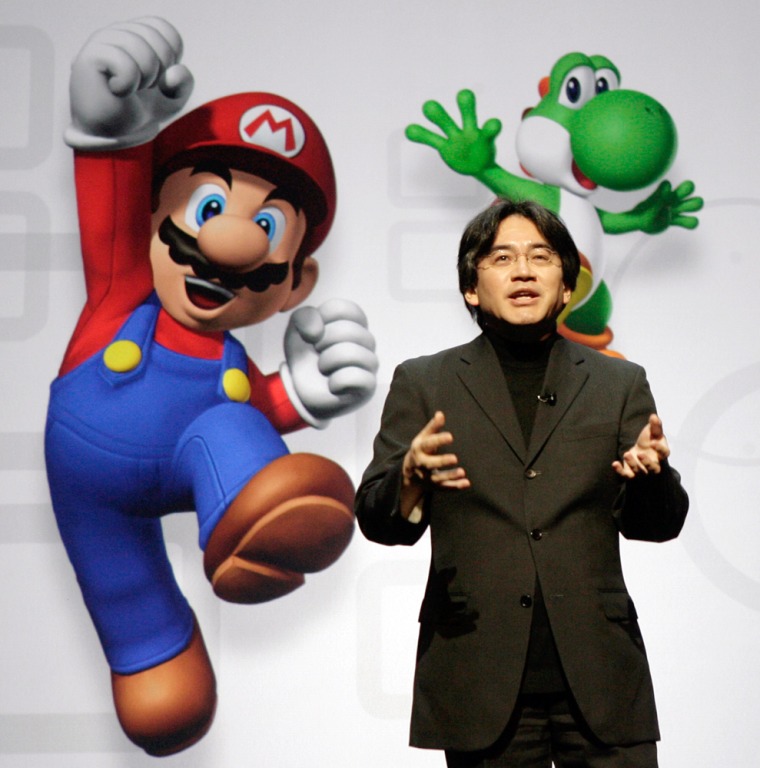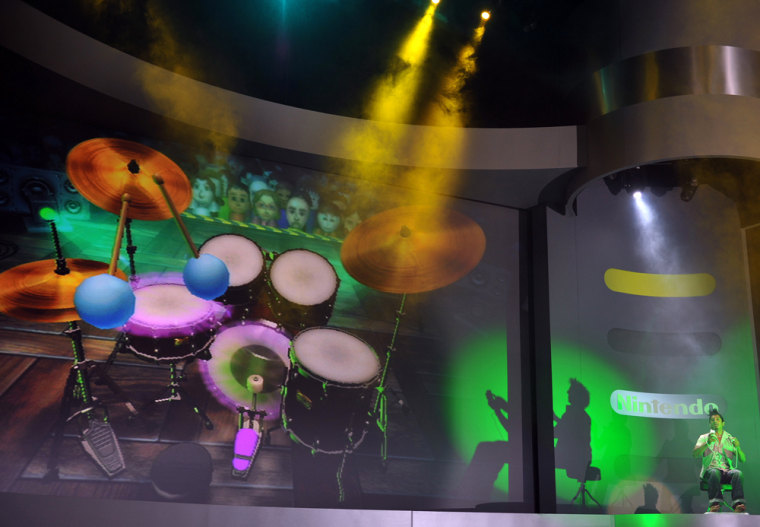Unless you’ve been living under a rock for the past five years, you know that video games are big. Huge. “Grand Theft Auto IV” made $500 million its first week. Revenues for the whole dang industry are up 30 percent over last year (in the United States, anyway). Your grandma owns a Nintendo Wii.
Call me cautious, but for every yin, there’s a yang. What goes up must come down. Scan today’s headlines (or yesterday’s … or last week’s) for evidence of other formerly hot industries that are now in the tank.
So, can the video game trajectory last? Or will it go the way of the Florida housing market?
The future, it seems, rests with grandma and her Wii. Your college-age son who loves “Call of Duty 4?” Not so much.
The game industry was doing great before the Wii. But it was still considered the domain of the hardcore gamer — young men, mostly, who liked to shoot things.
But the $250 console from Nintendo captured the attention of people who hadn’t really been into video games before, says Ben Schachter, an analyst with UBS. It expanded the market to include people like women and older gamers. It made the industry a whole lot bigger — and more profitable.
“The question is, will those people be buying more games in the future or is it going to be a fad where these things collect dust?” he says.
‘Danger in standing still’
During a press conference at the E3 game industry conference Tuesday, Nintendo of America president Reggie Fils-Aime acknowledged that consumers can get bored with hot items, “even when they’re revolutionary.”
“This happens faster when others try to reproduce the change,” he said, in a not-so-subtle jab at competitors Microsoft and Sony. “There is danger in standing still.”

Developers know which way these winds are blowing. The Wii has outsold the PlayStation 3 and Xbox 360 month after month. Ubisoft, known for its hardcore stealth games such as the “Splinter Cell” series and “Assassin’s Creed,” made 25 percent of its revenues last year from its casual products, which include the “Petz” games and “Rayman Raving Rabbids” for the Wii.
“Not only is this a serious effort by us, it's one of the big catalysts for our growth,” says the company’s vice-president of sales and marketing, Tony Key.
Still, most of the really great games for the Nintendo Wii are made by Nintendo. And that fact, says Schachter, could put the brakes on the Wii’s reign as king of the consoles.
“If third parties don’t figure out a way to make money on the Wii in the near term, they’re certainly going to have to rethink what the magic formula is there,” he says.
Just a fad?
But what if the Wii is a fad? The Tickle Me Elmo of the video-game world? Will the motion-sensing controller continue to bring consumers to the GameStop in droves? Or will the Wii go the way of the dodo?
“People will probably argue that the Wii could be a fad,” says Dean Takahashi, blogger for VentureBeat and author of two books about the Xbox 360. “But the direction that they’ve opened up for the industry is something that’s just at its beginning, and that is the idea of a much better user interface for controlling games.”
The Wii may be the winner on the hardware side, but the champ on the software side is most definitely Activision’s “Guitar Hero” series. Originally developed by Harmonix (which, interestingly, now makes rival game “Rock Band”), the “Guitar Hero” games have sold over 14 million units. With “Guitar Hero III” costing nearly $100 a pop, that’s a pretty big chunk of change for overall game revenues. And critical to the current growth trajectory of the industry, says Schachter.
“If people begin to stop buying music-genre games, that could have a meaningful impact on growth rates,” he says.
That doesn’t look likely — at least in the near term. The copycats are coming, including “Ultimate Band” from Disney, “Wii Music” from Nintendo and “Rock Revolution” from Konami. And despite holiday-season competition and a steep $170 price tag, Electronic Arts sold a million units of “Rock Band” in just over a month. A sequel is in the offing.
Thriving in a down economy
Speaking of price tags, it’s worth noting that the game industry has fared well in the down economy and despite a $10 price hike on next-gen games that started with the new console cycle. In March, I pondered whether the games biz could even be considered (dare I say it?) recession-proof. That theory will certainly be tested in the coming months.
But the economy seemed to be far from the collective consciousness at E3. During his remarks Monday, Microsoft exec Don Mattrick crowed that “we’re all thriving” in the game industry. It was a bit incongruous to head to a Nintendo press conference while at the same time President Bush addressed the White House press corps about the foundering economy.
Still, most economists agree that entertainment products tend to fare well when money gets tight. And after I wrote my column in March, I heard from plenty of readers who reminded me (often with math involved) about the relative cost-to-benefit ratio of video games. Take a family of four to see “WALL-E,” and you’ll drop 50 bucks for two hours of entertainment. Invest in “Rock Band” for the family and you’ll get endless hours of entertainment. (You’ll also get to introduce your kids to Molly Hatchet.)
At last year’s E3, everyone (including me) was asking “Who will win the console war?” But really, that’s beside the point now. The bigger question is: “Can the game industry keep up this momentum?”
The early signs look good, and that’s largely thanks to Nintendo making the market so much broader, says Takahashi. That benefits everybody — including Nintendo’s competitors, Microsoft and Sony.
“Just a couple of years ago, the console makers probably though it was a zero sum game — for us to win, we’ve got to kill the other guys,” he says. “But now, they all have a chance to be winners in a way that they didn’t think was possible.”
